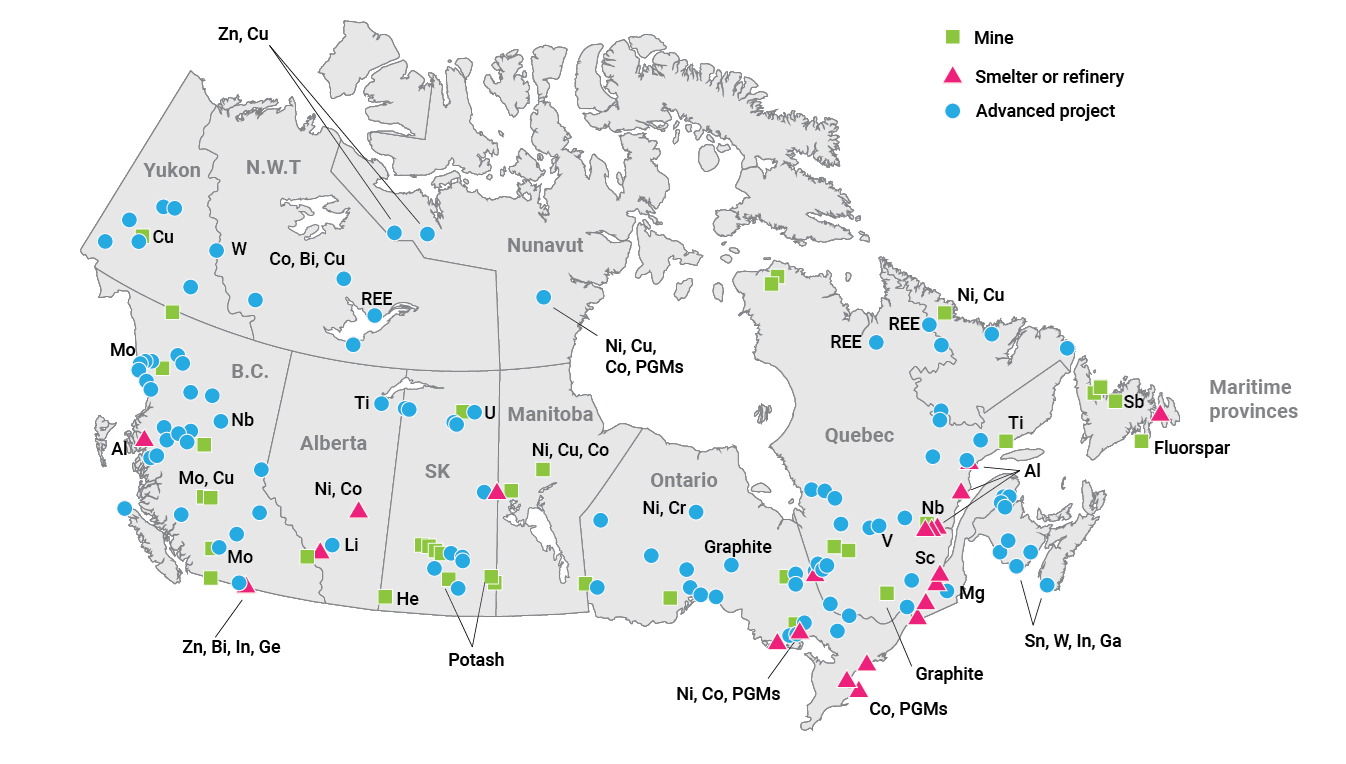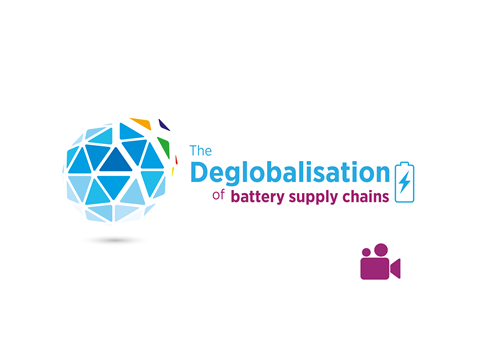Can Canada become an EV powerhouse?
New sustainable processes must be developed
17 February 2024
Urgent need for localised midstream supply chain development
SFA (Oxford) views Canada as a critical player for North American OEMs to achieve their decarbonisation goals, thanks to its abundance of critical raw materials, a robust automotive industry, and strong government support. However, to fully leverage its potential, the country must adapt and expand its well-established mining and automotive sectors to meet the unique demands of the EV industry. This involves retooling existing infrastructures and fostering crucial industry development from mineral extraction to vehicle assembly. Such development is still in its early stages and will necessitate significant investment, surpassing initial estimates, alongside substantial shifts in policy and innovation to ensure a seamless transition and effective contribution to the decarbonisation efforts.
Canada's EV supply chain growth: Major investments in Ontario, Quebec
Canada’s potential, particularly Ontario, took centre stage at the EV Innovation & Technology Conference last week, where representatives from PowerCo., GM and Northvolt, along with Ontario’s Minister of Economic Development, Job Creation and Trade, discussed solutions to the many challenges the country is facing despite significant developments and government support.
-
Northvolt plans to build a $7 billion plant east of Montréal with a 30 GWh battery cell manufacturing capacity by the end of 2026.
-
PowerCo, a subsidiary of Volkswagen AG, is investing $5.3 billion to build a Gigafactory in St. Thomas, Ontario, that is expected to be operational in 2027. The plant will have a 90 GWh annual capacity in its final expansion phase.
-
Umicore broke ground last Fall on the first phase of a pCAM and CAM battery materials processing plant in Bath, Ontario, with an initial investment of $1.4 billion that will provide critical minerals for over 0.8 million EVs per year.
-
GM and POSCO Chemical announced a $440 million facility in Becancour, Quebec, to produce CAM materials for its Ultium battery (NMCA), entered into a long-term supply agreement with Vale to secure nickel supply, retooled its Ingersoll assembly plant to produce electric vans.
Ontario’s automotive corridor: Windsor to Ottawa

Source: SFA (Oxford)
Canada tops China in BNEF's 2023 LiB supply chain ranking
Canada has the bookends for a robust domestic EV industry that would complement the US and Europe’s lofty green ambitions and eliminate geopolitical supply chain risk. Therefore, it was no surprise when Canada surpassed China in BNEF’s Global Lithium-Ion Battery Supply Chain Ranking for 2023, however, China's EV industry is unlikely to be emulated in N. America. The ranking assesses 30 countries annually for their potential to build a secure, reliable, and sustainable industry. This year, China slipped to second, primarily due to the industry development seen in Ontario and Quebec and China’s poor environmental record.
However, much of the midstream components to the EV battery value chain are undeveloped and will take over a decade to build out, if not more.
-
China’s had a 10-year head start in a different regulatory environment. Although Canada immediately benefitted from the passing of the Inflation Reduction Act (IRA) in the United States, spurring a tremendous amount of investment, the industry is still in its very early stages, and many parts of the value chain are missing. More importantly, given stricter environmental regulations, the processes used in China to produce battery materials cannot be used.
-
Obtaining the expertise required to build the midstream components between mineral extraction and vehicle assembly, such as battery processing, will take over a decade. It takes time to develop the educational programs necessary to build a skilled workforce in any field, let alone one as technically complex as battery production.
-
Dalhousie University has announced plans to build a new $13.5 million battery R&D centre, including a master’s level program in battery technology accepting students for the 2025 academic year. Students need to attend institutions outside the country to receive appropriate training to support the country’s fledgling battery industry.
Permitting reform and stakeholder management is required to accelerate industry development
Jurisdictional overlap between government bodies and lengthy public consultation has led to many permitting delays and conflicts. The permitting process for new mines currently takes about 12-15 years in Canada, as there are provincial and federal regulations and processes to follow. Each province in Canada has jurisdiction over the development and extraction of mineral resources within its borders and the construction, management, reclamation, and closure of mine sites. On the other hand, the federal government has jurisdiction over the environment, including fisheries, oceans, and First Nations territories and resources.
-
Using Ontario as an example, twelve provincial and federal ministries are involved in mine development in the province. As a result, several amendments were made to the province’s Mining Act to “reduce the administrative burden” under the Building More Mines Act, 2023. The Act will make it easier to develop brownfield mine projects, recover minerals from mine tailings and create more financial options, eliminating the need to pay all upfront costs.
-
Currently, there are 35 active mines, but only nine are for base metals such as nickel and copper. Nickel mining is well established in Ontario and Quebec, and recently, mine production has increased to 180 kt in 2023 compared to 134 kt in 2021. However, the development of other critical material production is not as advanced.
-
Despite the much-needed permitting reform within The Building More Mines Act, critics have noted that it is also a recipe for conflict with local communities, environmentalists and First Nations. Of particular concern is that the bill ignores the need for ‘free, prior and informed consent” from First Nations under federal law. Furthermore, the public consultation process in Ontario has been inconsistent at best, and there have been growing concerns over the environmental and long-term economic impact, especially given the greater number of mining claims in recent years.
-
Canada Nickel announced plans to build a nickel-cobalt mine and a battery-grade processing facility in Timmins, Ontario, that is expected to be operational in 2027. However, the project is still in the early stages of the permitting process and needs investment, as it costs C$1 billion to build a new mine in Ontario. The company received a US$18 million equity investment from Samsung SDI, but more investment from the private sector will likely be needed.

Canada's critical minerals mining and processing infrastructure

Source: SFA (Oxford), Government of Canada
The first solar-powered, carbon neutral cobalt processing plant in the US
SFA's battery metals expert, Kimberly Berman, is joined by EVelution Energy LLC, a pioneering private enterprise dedicated to establishing a carbon-neutral, modular cobalt sulfate processing facility situated in the state of Arizona.
Against the backdrop of the IRA and various other influential clean energy initiatives propelling the nationwide advancement of the lithium value chain industry in the United States, EVelution is at the forefront of the EV revolution in North America and is breaking ground on a $200 million project that will produce up 33,000 metric tons of cobalt sulfate annually.
About us
In the rapidly evolving landscape of critical minerals, which are pivotal for the advancement of green technologies and national security, comprehensive and forward-looking policies are essential. Critical minerals like lithium, nickel and cobalt, and rare earth elements, stand out due to their crucial role in the battery sector, especially for electric vehicles and energy storage solutions. The sustainable and secure supply of such minerals is a cornerstone for transitioning to renewable energy and achieving carbon neutrality goals.
SFA (Oxford) provides invaluable insights for stakeholders across the spectrum, from policymakers to industry leaders. This data-driven approach assists in navigating the complexities of the critical minerals market, underpinning strategies for resource development, supply chain resilience, and investment planning. For policymakers and industry professionals looking to deepen their understanding of the battery metals landscape, SFA offers bespoke research and consulting services. By leveraging expert insights and forecasts, policymakers can make informed decisions that balance economic, environmental, and strategic interests, paving the way for a sustainable future powered by critical minerals.


Upcoming events
Join us 9 May in Oxford as we delve into cutting-edge insights, innovations, and discussions led by the foremost authorities including SQM, CATL, and MINI at SFA (Oxford)'s Battery Metals Lectures 2024.

Brought to you by

How can we help you?
SFA (Oxford) provides bespoke, independent intelligence on the strategic metal markets, specifically tailored to your needs. To find out more about what we can offer you, please contact us.
